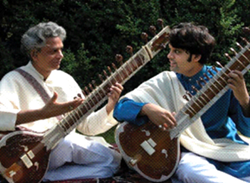Benares Gharana Music Concerts Austria

Varanasi (Sanskrit: वाराणसी VÄ�rÄ�ṇasÄ�)is a city situated on the banks of the River Ganges in the Indian state of Uttar Pradesh, 320 kilometres (199 mi) southeast of state capital Lucknow. It is regarded as a holy city by Buddhists and Jains, and is the holiest place in the world in Hinduism (and center of earth in Hindu Cosmology). It is one of the oldest continuously inhabited cities in the world and probably the oldest of India. The Kashi Naresh (Maharaja of Kashi) is the chief cultural patron of Varanasi and an essential part of all religious celebrations.The culture of Varanasi is closely associated with the River Ganges and the river’s religious importance. The city has been a cultural and religious centre in North India for several thousand years.
The Benares Gharana form of Indian classical music developed in Varanasi, and many prominent Indian philosophers, poets, writers, and musicians resided or reside in Varanasi, including Kabir, Ravidas Their Guru Swami Ramanand, Trailanga Swami, Munshi Premchand, Jaishankar Prasad, Acharya Shukla, Ravi Shankar, Girija Devi, Hariprasad Chaurasia, and Bismillah Khan. Tulsidas wrote Ramacharitamanas here, and Gautama Buddha gave his first sermon at Sarnath located near Varanasi (Kashi). Varanasi is home to four universities: Banaras Hindu University, Mahatma Gandhi Kashi Vidyapeeth, Central Institute of Higher Tibetan Studies and Sampurnanand Sanskrit University. Residents mainly speak Hindi and Kashika Bhojpuri, which is closely related to the Hindi language. People often refer to Varanasi as „the city of temples“, „the holy city of India“, „the religious capital of India“, „the city of lights“, and „the city of learning.“ Read More: > HERE <
Seit mittlerweile sieben Generation musizieren Vater und Sohn der Mishra Familie – Pandit Shivanth und Deobrat Mishra – gemeinsam. Music of Benares bringen mit Ihrer Musik den Zauber der mehr als 2000 Jahre alten Tradition der Sitar und Tabla zu uns.Ihre Musik lebt überwiegend von der Improvisation und folgt dem Ausdrucksreichtum der menschlichen Stimme. Deobrath Mishra wurde mehrmals als bester Sitarspieler Indiens ausgezeichnet.
Freitag 29.10.2010, Galerie Werkstatt NUU, www.nuu.at , Gesangs/Sitar oder Tabla Workshop mit Deobrath Mishra nach tel. Vereinbarung am 1, 2 und 3. November unter 0699 19429921 möglich!
Samstag 30.10.2010, 19 Uhr: Minoriten Kloster Tulln www.minoriten.at The Sound of India – Music from Benares, Shivnath & Deobrath Mishra, Sithar, Meister der klassischen indischen Musik, Festsaal/Klubräume – Eingang Nibelungenplatz. http://weltladen-tulln.at Weltladen Tulln: Wir feiern! Der Weltladen Tulln ist 5 Jahre alt geworden! Wir feiern gemeinsam mit den Vereinen Rainbowtrust (10 Jahre alt) und Miteinander leben (20 Jahre alt).
Gharana is a traditional style and way of teaching and performing Indian classical music. This style is many hundreds of years old and has been passed from master to student, from generation to generation. There are many Gharanas or styles, one of the most prominent ones being the Benaras Gharana. It is also called Varanasi Gharana. Over the years, the Benaras Gharana has produced many outstanding vocal, instrumental and dance performers.Like many traditions, this method of performing music and the great Indian cultural heritage, in general, have been threatened due to the lack of dedicated teachers and students.
A very rare Video clip of three generation’s of master musicians performing on same stage. Concert in Tulln-Austria 2009. Pandit Shivnath Mishra & Deobrat Mishra Sitar Artist from India, Prashant Mishra Tabla player. A paṇḍit (Hindi; Devanagari: पण्डित, Sanskrit: paṇḍita) is a scholar, a teacher, particularly one skilled in Sanskrit and Hindu law, religion, music or philosophy. The English loan word pundit is derived from it. Info Click here
The Guru (teacher)-Shishya (student) relationship which was the hallmark of this system is breaking down. If this tradition is not maintained, very soon it might exist only in textbooks. Pandit Shivnath Mishra and his family have descended from a highly talented musical lineage of Benaras Gharana going back several generations. In order to preserve this heritage, so precious to India, and make it accessible to children, Pt. Mishra and his family decided to create the Benaras Gharana Baccha ( The Children’s Project).
The aim of the Academy is to: Establish a school for the teaching of Indian Classical music in the traditional Benaras Gharana style; Provide scholarships to children to assist them in their learning of this musical style; Create opportunities for students and young artists to develop their potential through study and performance; Provide right livelihood for qualified and dedicated teachers.
For this purpose, the Mishra family purchased land in Benares on which to build a residential music school. The construction of the building took around three years to be completed and now the Academy is a well-structured place to receive students from all over the world.
For foreign students, who are committed to studying seriously, the Academy opens its doors providing them with all facilities needed such as a proper music hall, nice rooms with or without toilet attached, spacious kitchen, mineral water filter and dining room, apart from a safe and peaceful atmosphere. Moreover, it is located five minutes walk from the Ganga River.
The Benares Academy is a long-term and ongoing project. Your financial assistance and creative participation is most welcomed and appreciated.The Academy is registered as a charitable non-profit society under number V23536-2000.
-
www.swara.at Indische Musik und Tanz in Österreich
-
Benares www.back-to-life.com
Comments are closed.